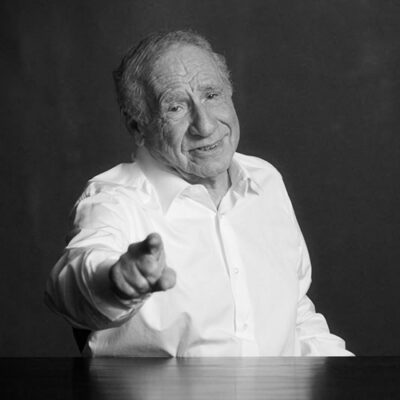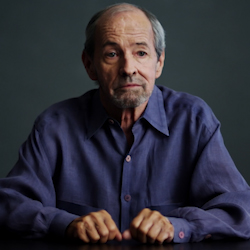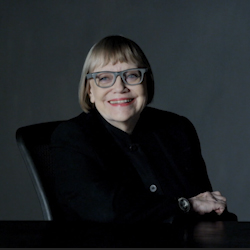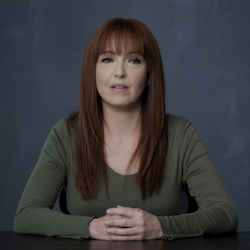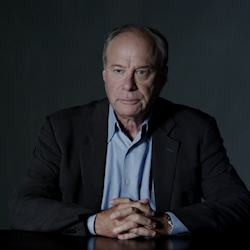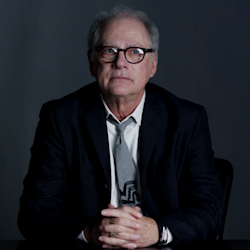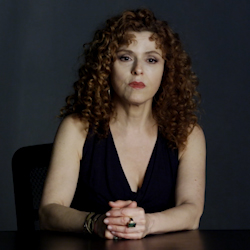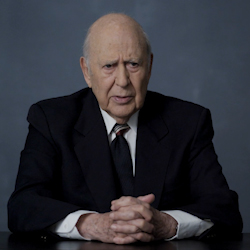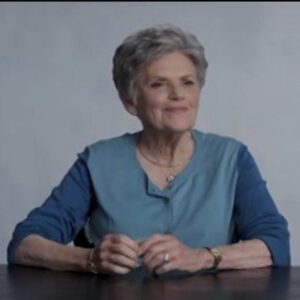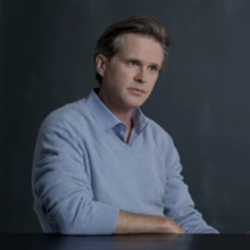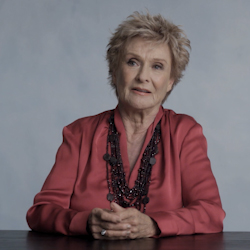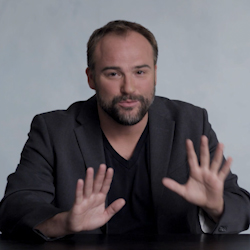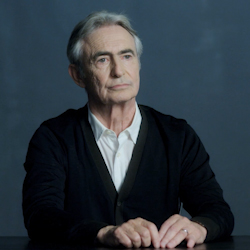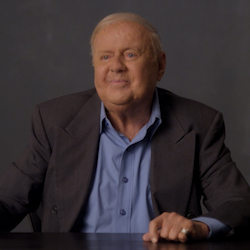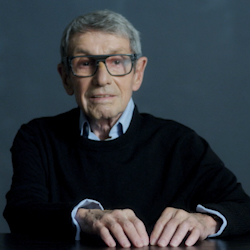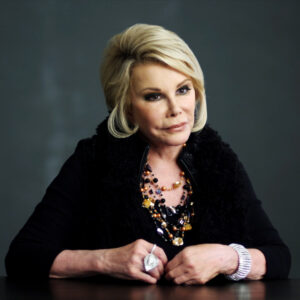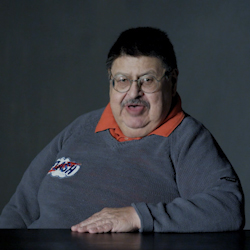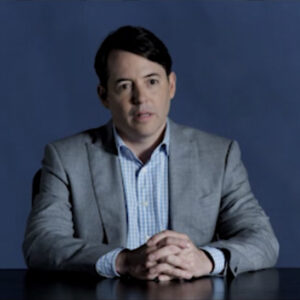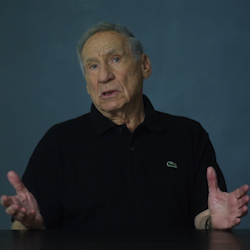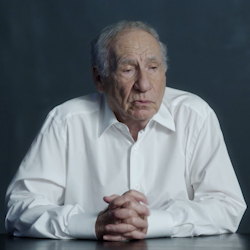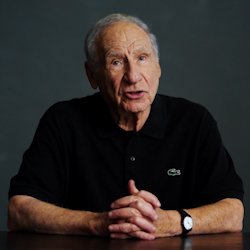Interviewer: How you get the job on Spaceballs.
Bill Pullman: You know, I had been doing theater and I came to L.A. to do a play and then I got cast and ruthless people as my first movie. And I was thinking that that was, you know, a nice experience. I got a little cash. I was gonna head back to New York. And then all sudden, I get this call that I’m to meet with Mel Brooks. And I thought, oh, I’d be like the other part. I did a small little partisan and but no, it turned out it was for Lone Star. And he had come with Anne to see me in this play I was doing at the time, that was a very bizarre to go on the Christopger Marlowe called Barabas. And somehow.
Interviewer: OK. Pick it up from he had cone to see me. They’re working on the roof. OK.
Bill Pullman: Stop the party over there.
Interviewer: No, no, no. It was up there.
Bill Pullman: Oh, ok.
Interviewer: OK. He come to see me.
Bill Pullman: Well Mel and Anne came to see Barabas, which was at the Los Angeles Theater Center. And so from that play he said, yeah. He then, you know, once I started to show up there because he liked to have rehearsals. But Rick and John didn’t want to go to rehearsals because, you know, it was very interesting. Mel has a good memory of this whole thing. But there was I remember thinking that this was a little hard on Mel because the John Candy and Rick Morenas were the new comics and they had gotten signed to Spaceballs. That’s how the picture kind of got green lit. And so Mel was used to having Mel Brooks was enough, you know, and then he had his choice. But it was a big movie, expensive movie. So he had to kind of submit to letting John and Rick kind of be important to the whole, you know, process and. But, you know, I think he always resented that he had to kind of kowtow to the new comics. But and so when we got there. Daphne Zuniga and I would show up because we were green as hell and he could. And so we’d show up at his office to rehearse. And now, as always, you know, he loved to rehearse. And we’d go and rehearse for a while with Tom, the writer. You know, we’d be there and. And Mel would be trying out lines and everything you could see. He was so excited about having this endeavor ahead of him, you know? And I think part of the rehearsal was just to kind of get it going because he couldn’t wait fast enough for a start shooting and. But he was also really hard on himself by the script because he said, you know, that’s the the three pillars of a production is the script and the cast and then the post-production. And, you know, the the cast in the shooting is very important. But the script more important than anything else. So he really would ask tough questions about you. Is it good that he comes in here or maybe he should do something else? You know, he was always kind of hashing it through right up until the first day shooting.
Interviewer: Did. Was it a big leap for you to jump into that rhythm of comedy?
Bill Pullman: Yeah, yeah. Yeah, it was. You know, he would basically give us all line ratings, you know. And the thing was that he was so hysterical at Highline ratings. You never minded it, you know, because he would give you. It would, but you couldn’t do it exactly why he did it. You have to do a Jewish exodus of the B Lonestar with Jewish accent all the time. But everything is funnier with Jewish rhythm. And take it when he would do the best thing. Line ratings. He ever game was the Daphne, you know, because the Jewish princess say, oh, Mel would like throw his head up all the arrogance of a Jewish princess. And you do those lines. I it just killed me. So it was hard for me to remember. Oh, I got to do this because he’s so funny doing me as good. But I eventually kind of got along and he he you know, he was very kind to me. I always felt he loved me deeply, you know, and he would grab my head and just. Yeah, I like you, Billy, you know. But then he was really cutting and, you know, harsh and, like, get on it, you know. And but it was all for good. You know, if all for good. I really felt like I was in the presence of a genius. You know, I really felt comedy wise, you know, a lot of people’s, you know, the fear. I remember, you know, John Candy, Rick Moranis said that at that time, you know, it’s like is Mel’s comedy old? It comes from vaudeville. It’s the old comedy. Kids don’t like it. Young audiences don’t like it. And so we got to find new rhythms and everything. But in spite of all that, I remember thinking this guy really he you know, he turns the corners of a joke on a dime and he really understands architecture and of a of a sequence. Yeah. Things he would say, you know, just always have stuck in my mind as much as any anybody else other than David Lynch, you know, that I’ve worked with and lucky enough to work with. But Mel I remember he said 10 percent of anything is good. Wow. That, you know, that’s that’s a high standard. But in a way, the same time, I could see what he meant, you know, really great stuff. That’s only 10 percent. And that’s what you’ve got to aim for is the great stuff, you know. So he would take a power nap. He was a big napper. He’d lie down for five minutes, then get up and he’d be have new ideas. It was like his brain would really, you know, can percolate in those naps and he’d get up and have a thousand new ideas.
Interviewer: That’s kind of what I was asking him.The sort of pyrotechnics of making this kind of a movie were sort of bogged down for him like the river, just getting it done, you know.
Bill Pullman: Yeah. Yeah. Well, you know, he did. I remember the long shots that were, you know, wide shots that had to like when we would go, we were in the Winnebago and we had to go in there and fight the Spaceballs and then come out in the spaceball outfits. And there was a Winnebago, real Winnebago with real wings on it. And they tried everything to shake the camera. That wasn’t funny. And they couldn’t figure out how to do it. And the whole thing was just bug. And now he wants to, you know, get right to cut to open up the door, come out of there dressed as Spaceballs. How come we’re having so much trouble with this kind of stuff? And they ended up really cranking the camera really fast. And then they had Grip’s on the engine of the of the wings, just like rocking as fast as they could. I remember several more you of you grips get out there. That’s why you feed your lunch. You can be heavy and make that thing shake. Now. Yeah. And then we had to come running out because the camera’s over cranked. We had to run in slow motion. You know, we come out of the out of the thing dressed as Spaceballs, but we had to kind of run in slow motion so that when it was restored to, you know, what speed they wanted to the thing would go like this and then we’d come running out. And it was when Candy said Pohlmann, this is why you took acting one to one. Remember all that stuff you do if you like, going through peanut butter and stuff like that. That’s what we got to remember now.
Interviewer: But ultimately, yeah, the humor is based in well, it is an interesting thing going through this whole process. The humor is based in vaudeville, but it’s we’re talking about this earlier. Joan Rivers was here earlier. And I’ve been doing this all summer long, man. And but with Joan, I was saying and I interviewed Tracey Ullman, what’s a cheap joke? What is a cheap joke? Because if you’re laughing, it’s visceral. You don’t say like there’s a cheat such thing as a cheap cry. I mean, I guess tear-jerker but it’s still a visceral emotion, right?
Bill Pullman: Yeah.
Interviewer: So, okay, you can argue about the rhythm of the joke. I’ve heard the rhythm a million times, but you’re still laughing, you know. And so this these guys sort of say like, oh, new comedy, you know, is it it’s funny how some of that stuff looks a little dated. You know, the foundations for what he’s working on. And I know sometimes it doesn’t always work. But the fact I mean, this film is a cult film. This is his biggest film.
Bill Pullman: Yeah. Yeah.
Interviewer: This is I mean, it may not be as witty as Young Frankenstein or Blazing Saddles, but this film does not stop. It’s crazy. Yeah. I hope you’re getting checks or something.
Bill Pullman: No, no, no. I haven’t gotten a check ever. But Mel, I mean, you know, he’ll get a check over this thing. I won’t. He’s the engine.
Interviewer: But you see what I mean? What I’m getting at. Is it like it? This is whatever you wanna call a dinosaur comedy, but it lives.
Bill Pullman: Yeah. Well.
Interviewer: I mean, did John or Rick come around to it or were they kind of a little kind of old school? We’re here. We’ve got to get through it.
Bill Pullman: Well, I think they’re you know, they they were constantly wary and cautious. But I think at the same time, there was a tension that made them work extra hard to kind of make their things work because they would, you know, have to kind of like, say now push Mal back a little bit and say, we wanna I want to try to do a little something like this, you know. And Rick was more assertive than John, you know. But John too would be, you know, but John would get me in trouble sometimes cause he’s so kind. He so kind. You know, and everything. And now I’d be, you know, couldn’t yell at Rick, couldn’t yel at John. And John would, you know, standing in the way, sometimes I go, you know what he is? Bill, I think he’s doing a good job on it.
Interviewer: Sorry.
Bill Pullman: Yeah. Joan Rivers, man, she is a genius herself.
Interviewer: She was great. Go ahead, Yes. Pick it up from John.
Bill Pullman: Well, you know, John would get me in trouble with Mel sometimes. And I remember we had a we were in that scene that we were shooting it on the MGM lot in the same soundstage that they had shot the Wizard of Oz. And we’re going back through. And now it’s the four of us rather than the four, The Wizard of Oz. And we’re turning a corner and looking down. And John had a line that he didn’t like and I just could see he was one that Mel had given him and he just didn’t like it. And Mel was going. you gotta have you know, have a little more zing, John and John said I don’t think I need to do this line. Why don’t you give it to Bill. And Mels like what? I said, I don’t want the line. Don’t give me line. You think Bill can make this line funny, you know? Oh my God. It was tense. It was tense. Eventually it worked out. But I kind of was. But but at the same time, you know, there was a lot of good spirit in between, you know, and this. This was a new there was a big thing. You know, it seems all so archaic. But we had green screen and there was a newness to green screen. And we’d sit in the Winnebago. A lot of times in that green screen was right up there. And they had a theory that the green screen would hurt our eyes. So every time they call cut, we had these sunglasses and we put on sunglasses. That was the most absurd thing to sit in that Winnebago just like it did between cuts. Is it the funnest thing. Because you put on sunglasses and everybody talk about what was funny, what wasn’t funny and everything. Okay, ready. And we take the sunglasses off.
Interviewer: Wow. The that scene that you’re talking about, we walk up and he shows you all the merchandising. There’s something brilliantly surreal about within the movie. Commenting about the merchandising of the movie.
Bill Pullman: Yeah.
Interviewer: I mean, were you aware that. Were you aware that he had talked to Lucas and Lucas said anything but no merchandising.
Bill Pullman: No. No.
Interviewer: Yeah Lucas told them to say, this is great. Go ahead. Only one request. Do not put out any merchandising on this movie because you’re gonna be taking money away from me.
Bill Pullman: Oh, man.
Interviewer: So you can imagine, like, the out all that stuff that he was if he had actually put that out. It would be very it would have really actually kind of gone because it’s so, so really weird. No, Lucas said don’t do that.
Bill Pullman: Oh, man.
Interviewer: But the fact that his or the way his mind works. Too precious to be making fun of the merchandising, knowing really that’s where the bulk of it live. You know, I mean, that’s where all the money was really.
Bill Pullman: Well, they hadn’t realized what would happen with VHS and DVD. You know, I think that was also before that craze happened. So once the movie really hit VHS, that’s when the real cash cow started getting milked. Yeah.
Interviewer: Yeah, yeah.
Bill Pullman: Cause when it came out, it was not a success. It was it was critically it wasn’t wasn’t well received. You know, it’s kind of lukewarm. And most people said this is Mel Brooks kind of at the end of his game. I think it grossed 22 million dollars or something like that, which was not a lot. Not what they were expecting at that time. And and I remember thinking, well, that’s that’s not going to be one of Mel’s most important movies. But then once you know we had a kid over for supper and I happen to mention an hour or two into it, something about Spaceballs, you go, oh, can we talk about Spaceballs? And he knew everything, every line and everything. And I realized, wow, something’s happened here. These kids are watching it over and over again.
Interviewer: Yeah. What seems to be happening is that they start with Spaceballs and then they eventually graduate to Young Frankenstein. You know, it’s almost like he worked in reverse. And you’re like, there’s Mel Brooks for every age group at this point. Yeah, it’s. It’s. Yeah. And then you can graduate to Brooks films like The Elephant Man or Francis or something like that. Anything I’m forgetting.
Bill Pullman: No, I think that’s it. I think we got some good stuff.
Interviewer: We did. Thank you so much.
Bill Pullman: All right.

